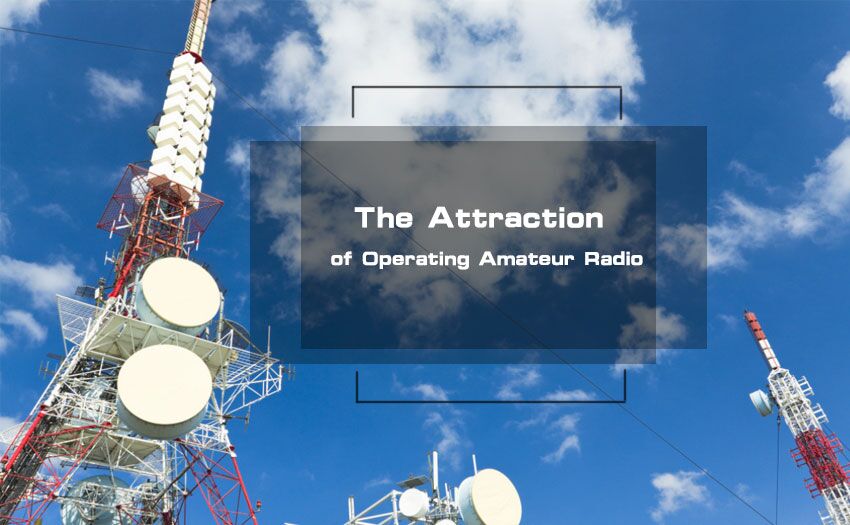+86 15093323284 hams@ailunce.com
What's the Attraction of Operating Amateur Radio?

I saw an article written by W3TTT on the eham.net, it let's me learn the attraction of operating amateur radio from another angle.
"I have always wondered about the attraction of operating amateur radio.
What is the benefit, what is the emotional payback?
I am sure that everyone reading this does experience some thrill in operating on the ham bands. And everyone has a favorite type of operating, whether it is DXing, Contesting, Net operations, CW or SSB or digital.
It occurs to me that there are other human activities that have similar emotional payback, as we experience in ham radio. One of these other activities is hunting. The other activity that seems to provide an emotional payback is gambling.
With gambling, the gambler puts down the bet and expects a real monetary payback. The gambling games include poker, blackjack, roulette, and of course, the "one armed bandits" otherwise known as slot machines. Like hams who have their favorite types of operations, gamblers have their favorites too. Poker is the most active; and slots are the least active for the operator. I really do not understand the attraction of slots. Today's slot machines are just random number generators, with a possible payout. The odds are very high. But people will sit at a slot machine for hours, just pushing the button and getting some sort of emotional payback.
Hunting is similar in these ways. It is not always certain that a hunter will make a kill and bring home the meat. There is an uncertainty to the process. And a great emotional payoff if and when the hunter is successful. Hunting is also a type of gamble.
I'll bet that many of you hams reading this can guess where I am going with this piece.
My theory is that all three activities, Ham radio operating, gambling and hunting affect people in a similar way. All three will "light up" the areas of the human brain that are known to researchers as the pleasure centers of the brain. And did I mention "drugs" in connection with the pleasure centers of the brain?
"Dopamine release in the nucleus accumbens is so consistently tied with pleasure that neuroscientists refer to the region as the brain's pleasure center. All drugs of abuse, from nicotine to heroin, cause a particularly powerful surge of dopamine in the nucleus accumbens." (Understanding Addiction - HelpGuide.org)
"The ventral striatum, located deep inside the brain, has been termed the brain's reward center, and it's been implicated in reward processing as well as substance abuse.
When people with gambling disorder watch gambling videos or participate in simulated gambling while their brains are being scanned, scientists can see changes in blood flow in specific brain areas, indicating which areas are more active. In one study, both problem gamblers and cocaine addicts watched videos related to their addictions while in a functional magnetic resonance imaging (fMRI) scanner. Both groups showed diminished activation in the ventral striatum compared to healthy control participants." (www.brainfacts.org/Diseases-and-Disorders/Addiction/2015/Gambling-Addiction-and-the-Brain)
So, science has located the brain's pleasure center, and has shown that drug addiction and gambling addiction are "in control" of the brain's pleasure center.
Now, with that said, let's take another look at hunting. The activity of hunting might have been vital to survival of the species. At some times, in the ancient past, it might have been necessary for survival to hunt. Those individuals who got pleasure from hunting would have an advantage over those who did not. The act of hunting (searching and pouncing for the kill) then affects the brain's pleasure center.
In fact, it might be this very pleasure mechanism in hunting that motivates gamblers. That is, because humans evolved with the hunting pleasure center in the brain, that gamblers use this for their own and get their emotional payback through the hunting pleasure center in the brain. Gamblers have high jacked hunting brain pleasure center. It seems that people can do this - substitute one pleasurable activity for another.
Which brings us back to ham radio. Could it be, that we hams have associated (in ourselves) the brain's pleasure center and redirected the brain to light up the pleasure center when we do our ham radio activities?
For instance, consider contests and contesters in ham radio. Many like to "hunt and pounce" on stations to contact.
Consider DXers. These fellows certainly spend hours "hunting down" DX stations, and when found, they pounce!
Builders, on the other hand, don't do a lot of "hunting", unless you consider "hunting for parts". But there is certainly a type of pleasure in building, completing, debugging and displaying a home brew rig.
Summing up, we see that ham radio has a very pleasurable aspect to it, and that this pleasurable aspect is mostly a learned pleasure, that does not come naturally, but must be developed and learned.
Therefore, in order to attract new people to ham radio, we need to somehow teach or instill this "joy of the radio hunt" to them. Sure, one can pick up a cell phone and dial anywhere in the world. But, that's no fun. The fun is in the hunt. And in the pounce.
Thanks for considering this aspect of the hobby.
73, W3TTT"
Source: eham.net











